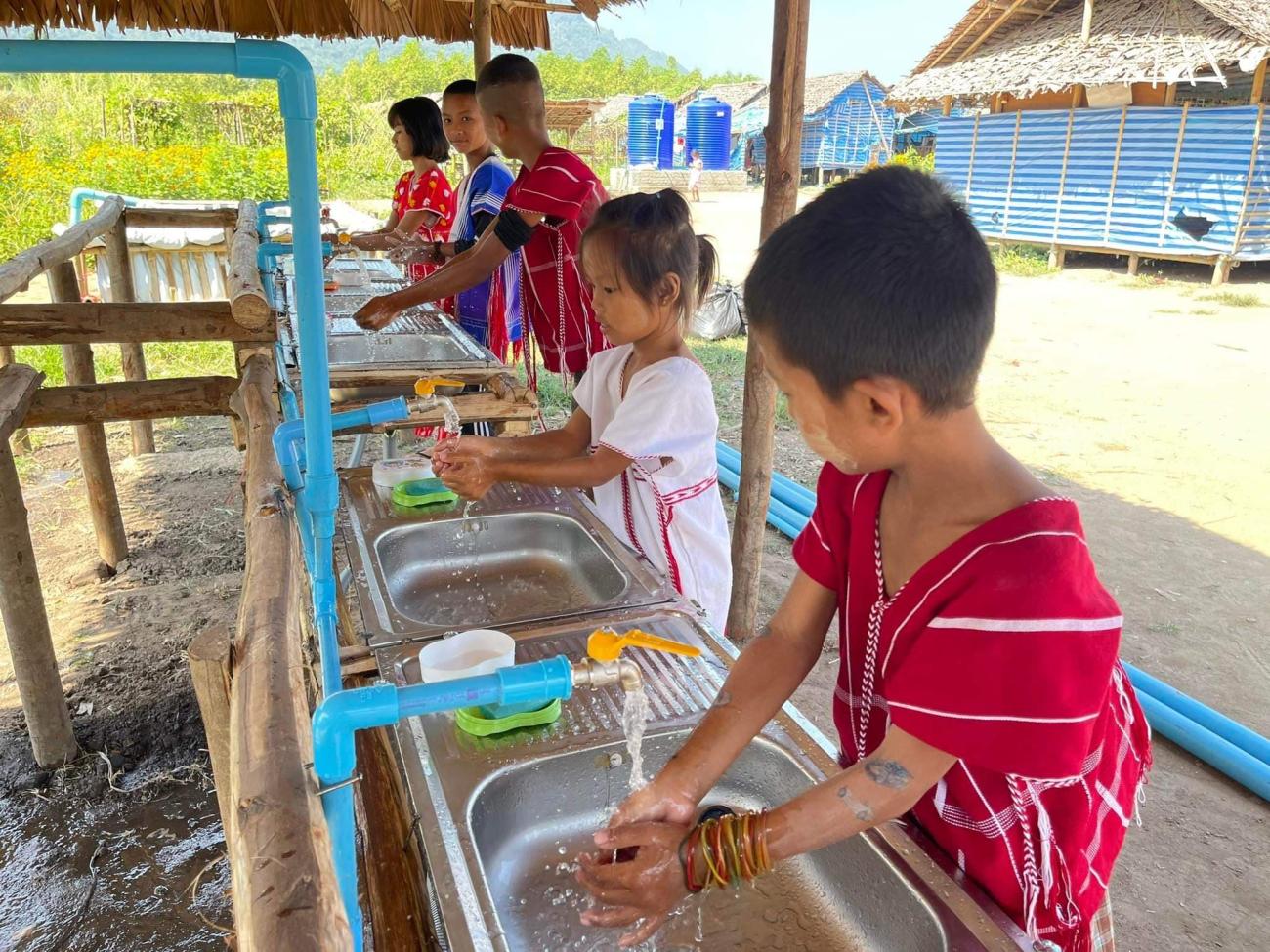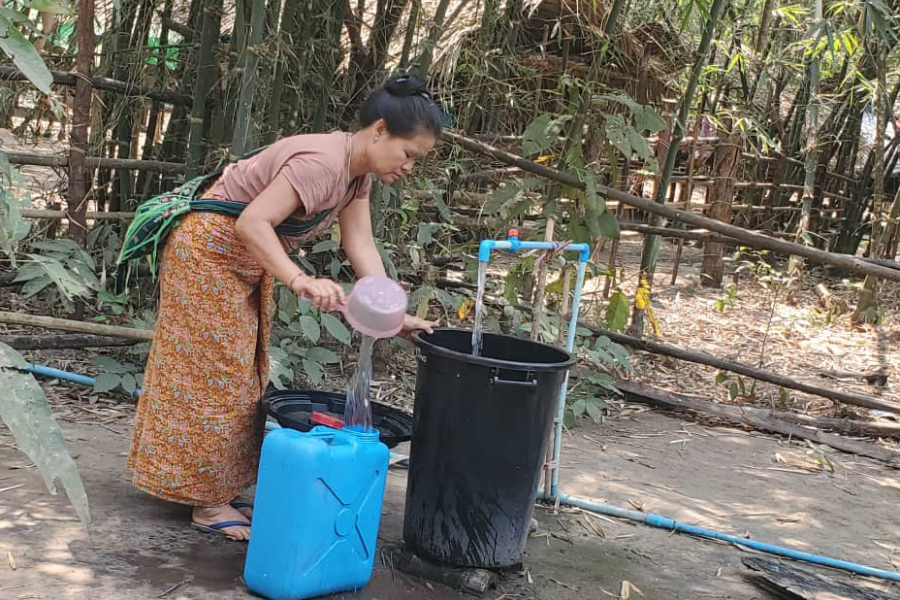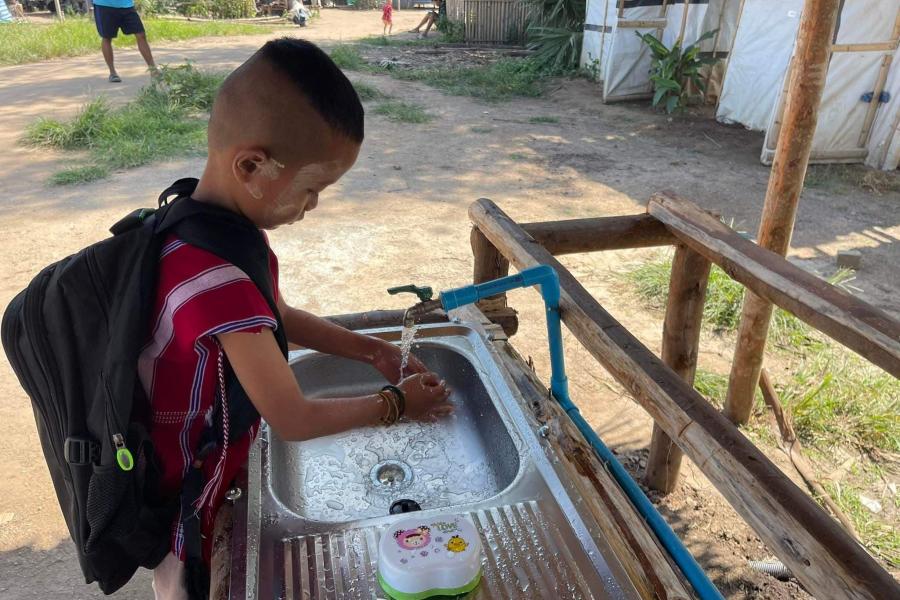A lifeline of hope

How access to water and hygiene services is heralding hopes for newly displaced families in Kayin State, Southeast Myanmar
"In the midst of spiraling violence and displacement, the harsh reality struck us with full force; prices soared, rendering basic hygiene products unattainable luxuries," explained Daw Aye Tin, a mother of two who, like countless families, was compelled to abandon their homes and communities in Nan Tawt Koe village and neighboring areas in Kayin State, amidst the escalating conflict.
Having fled their homes with nothing, seeking refuge in Naung Kine township has been particularly challenging, with overcrowded facilities and limited livelihood opportunities exacerbating their struggle to meet critical water and hygiene needs.
"Water scarcity became our daily battle, while the few toilet facilities, distant and perilous to reach, added a layer of fear, especially under the cloak of night. The impact was devastating, amplifying the hardships we faced with each passing day."
Adding to their burden, Daw Aye's family situation is especially difficult as injuries suffered by her husband during an attack near their home are still healing, leaving him unable to work to support the family, compounded by two children to fend for.

In addition to the arduous task of catering for her family, she constantly fears for the health and well-being of her children, with the heightened risk posed by the reliance on open water sources and the generally poor hygiene situation in the overcrowded displacement sites. Seeing children coming down with different illnesses is a common sight, stretching the already meagre resources of displaced families.
"The fear of my children falling sick is my worst nightmare, and sadly, it's a constant threat," lamented Daw Aye, her voice heavy with concern. "With the poor hygiene conditions and reliance on open water sources in this shelter, the risk is ever-present. Witnessing children succumb to various illnesses is heart-wrenching, as it only adds to the struggles of displaced families already stretched thin."
Recognizing the dire circumstances faced by displaced families like Daw Aye’s, UNICEF and partners, in late 2023 embarked on a collaborative effort to implement an integrated water, sanitation, and hygiene (WASH) project targeting the most affected households across Ta Nay Cha, Baw Ner Hta, Joe Phyu, Ler Moo Shee, and Naung Kine townships.

This initiative offered a breath of hope to displaced families by distributing essential hygiene materials, conducting engaging hygiene promotion activities, and installing vital water filters. These efforts helped to address immediate hygiene and sanitation needs, empower individuals with knowledge and resources for long-term health, and foster a sense of resilience and dignity within the displaced communities.
“This support has been a lifeline for my family and countless others in our displaced community”, said Daw Aye, reflecting on the transformative impact of the project. "With essential hygiene materials, engaging education, and clean water at our disposal, we regained a sense of dignity and security amidst adversity. It was more than just access to resources; it was a beacon of hope for our future."

The UNICEF-supported project facilitated the construction of gender-segregated latrines, equipped with proper waste disposal systems, elevating sanitation standards and promoting the dignity and privacy, especially for the vulnerable women and girls in the community.
The empowering hygiene education sessions equipped community members with invaluable knowledge about proper hygiene practices, including essential skills like handwashing techniques and menstrual hygiene management.
“The project has truly transformed our community, bringing improved sanitation and valuable knowledge about hygiene practices, and we are truly grateful. Not only have our sanitation standards elevated, but we've also witnessed the wellbeing and health of our children improving, with fewer falling sick,” said Daw Aye.
Expressing gratitude, Daw Aye notes that “although life as displaced people remain challenging, with uncertainty looming over our heads, we can now look forward with optimism, knowing that we have access to potable water and improved hygiene facilities. This brings us a glimmer of hope for a better tomorrow."
With the increasing number of newly displaced people due to escalating conflict, UNICEF is strengthening collaboration with frontline national NGOs to enable the prompt delivery of essential aid to displaced and vulnerable families, including those in hard-to-reach areas.
The story is originally published on the UNICEF Myanmar website.




